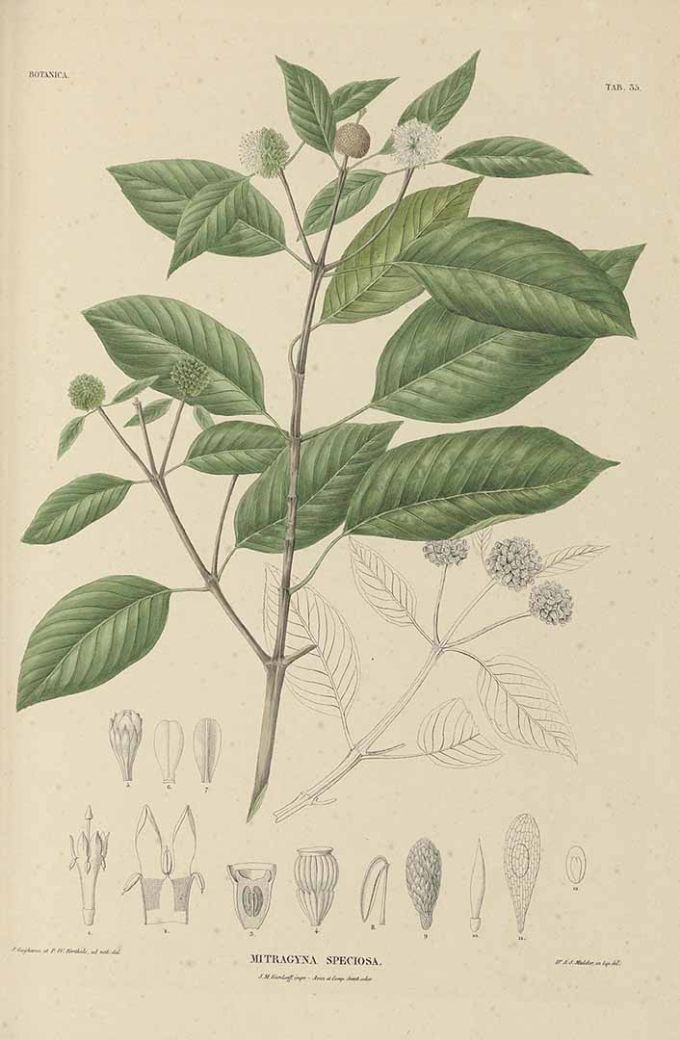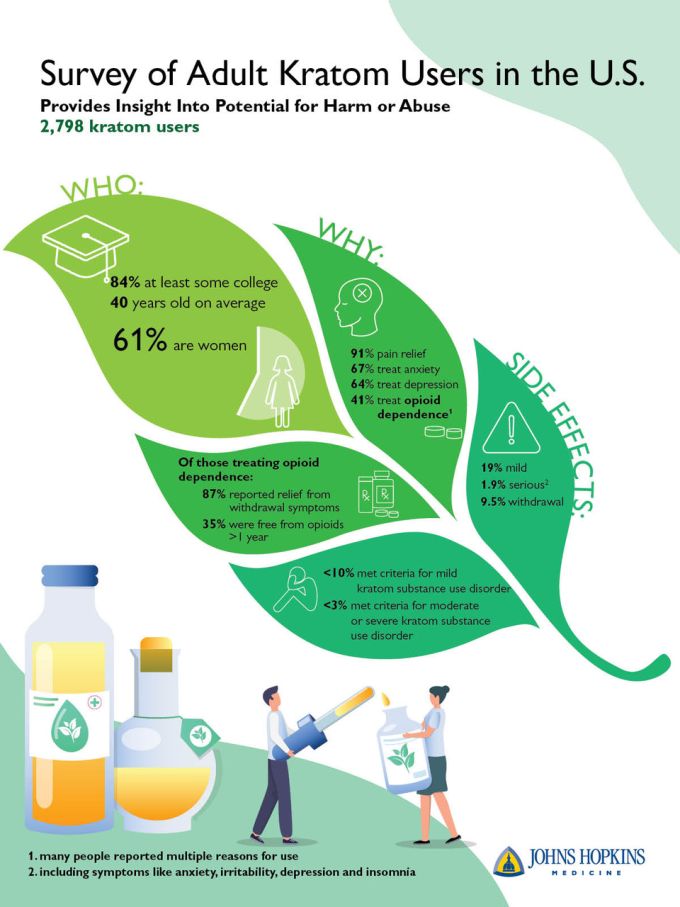What is Kratom, and how long does Kratom last? How is it that I’ve never heard of this incredible supplement before? And is there anything that Kratom can’t do? Kratom, also known as Mitragyna speciosa, is a tropical tree part of the coffee family. It’s native to Southeast Asia. The leaves of the kratom tree contain compounds called alkaloids, which have various effects on the body.
While you may have only heard of this remarkable plant recently, the use of kratom has a long history in Southeast Asia. There it has been used for centuries for wellness purposes. The leaves of the kratom tree were traditionally chewed or brewed to release the alkaloids and provide pain relief and improved mood. In addition to its wellness use, kratom has also been used as a stimulant and a sedative, depending on the dose taken. But today, you can find Kratom all over the United States.
Ready to learn more about this traditional Eastern plant? We thought you might be.
What Is Kratom?
As we already noted, Kratom is a tropical tree native to Southeast Asia. It has been used for centuries in the Eastern part of the world. But unlike delta 11 or THCP, this new product is not a cannabinoid. Kratom leaves have, for centuries, been prized for their alkaloids, which can cause the body to speed up, slow down, and, in some cases, heal. Most notably, people use Kratom for the following reasons:
- Pain relief
- Improved mood
- To curb cravings
- Wellness
The Genus of the Kratom Tree
Today, Kratom is found all over the world in the form of Kratom supplements, Kratom powders, and Kratom Gummies. Kratom belongs to the Rubiaceae family, the same as coffee and gardenia. The tree is native to tropical regions of Southeast Asia and is commonly found in the countries of Thailand, Malaysia, and Indonesia. Kratom is now also grown in other parts like Africa, South America, and the United States.
It is important to note that the long-term safety of Kratom use is not well understood, and its effects on the human body are still under research. Currently, Kratom is not approved by FDA to cure or prevent any disease or illness. Also, it is not legal in all countries and states. As with all things, users should consult an expert before using Kratom.

Does Kratom Show Up On A Drug Test?
Let’s answer the big questions early so we can end your anticipations. We’re sure everyone here is wondering whether or not Kratom will pop positive on a drug test. And these are important questions — Whether you need to pass a test for work, future employment, court, or any other reason, you should know the facts.
First things first, though. Let’s review the different types of drug tests out there briefly.
What Types of Drug Tests Can Possibly Be Used?
Drug tests are used to detect the presence of drugs or their metabolites in a person's body. Whether you take Kratom, use cannabinoids like delta 8, or something else, there are several different types of drug tests, including:
- Urine tests: Urine tests are the most common type of drug test. They can detect a wide range of drugs, including marijuana, cocaine, opioids, and amphetamines—the test works by detecting the presence of drug metabolites in the urine.
- Blood tests: Blood tests can detect the presence of drugs in the bloodstream and are used to detect recent drug use. They are less common than urine tests but can be more accurate for detecting current use.
- Saliva tests: Saliva tests can detect the presence of drugs in the saliva and are used to detect recent drug use. They are less invasive than blood tests, but may not be as accurate for detecting certain drugs.
- Hair tests: Hair tests can detect the presence of drugs in the hair and are used to detect long-term drug use. They can see drug use for a more extended period than urine or blood tests, but they are less common.
- Sweat tests: Sweat tests can detect drugs absorbed through the skin and deposited in sweat. They are less common but can detect drug use more often than urine or blood tests.
It's important to note that different tests have different detection windows and can detect different drugs. Some tests are more sensitive than others and may detect drugs that other tests do not. It's also important to note that the results of these tests may vary depending on the testing laboratory, and it's vital to ensure that the laboratory is accredited and reliable.
So, Will I Pop Positive for Kratom?
Kratom is not a controlled substance or included in standard drug tests. However, some specialized tests may be able to detect the presence of kratom alkaloids in the body. It's important to note that kratom is not legal in all countries and states, so it is essential to check the local laws before using it.
As with any other substance, if you know you have to take a drug test, we always recommend that users err on caution. Take a few days off or abstain for a while until after your test. Better safe than sorry!
How Long Does Kratom Stay In Your System?
The length of time that kratom stays in the system depends on several factors, including the dose taken, the frequency of use, and the individual's metabolism. On average, kratom can be detected in the urine for up to 9 days after last use.
But you should be asking more than, “how long does kratom stay in your system.” Some of the factors that affect how long kratom can stay in your system include the following:
- Dosage: The amount of Kratom consumed will affect how long it stays in the system. Generally, the higher the dose, the longer it will remain in the system.
- Frequency of use: Regular use of Kratom can lead to accumulation of the alkaloids in the body which can prolong the time it stays in the system.
- Metabolism: The rate at which a person's body metabolizes Kratom can affect how long it stays in the system. People with faster metabolism may clear the alkaloids from the body more quickly than those with a slower metabolism.
- Age, weight, and overall health can also affect how quickly the body metabolizes Kratom.
- Type of test: Different types of tests have different detection windows and can detect Kratom for a further time. For example, urine tests can detect Kratom for up to 9 days after last use, while hair tests can detect Kratom use for several months.
It's important to note that these are general guidelines, and the specific detection time may vary depending on individual factors.
How Long Does Kratom Last?
The effects of Kratom can last anywhere from a few hours to several days, depending on the dose taken. Lower doses tend to have a more stimulating effect, while higher doses can have a more sedating effect. The onset of the impact can be felt within 10-15 minutes of consumption, and the results can last for about 5-6 hours.
Can I Make the Effects of Kratom Last Longer?
A few things may be done to extend the duration of the effects. One should take lower doses, as higher doses can cause a more intense but shorter-lived effect. Another is to take Kratom on an empty stomach, as food can slow down the absorption of the alkaloids.
Another way to extend the effects of Kratom is to use a different method of consumption. For example, making Kratom tea can slow down the absorption of the alkaloids and cause the results last longer. Also, using Kratom in a capsule or tincture form can extend the duration of the effects.
It is important to note that the effects of Kratom can vary greatly depending on the individual and the specific strain of Kratom used.
Can You Smoke Kratom?
In an era where everyone loves to vape, there’s still a widespread call for smoking various products. But what about Kratom — can you smoke kratom?
Surprisingly, the answer is yes!
Kratom leaves can be smoked, but this method of use is not as standard as other methods, such as taking it in capsule or powder form. Smoking kratom can be harsh on the lungs and may not be as effective as other consumption methods.
What Are the Different Ways I Can Take Kratom?
Of course, smoking isn’t the only way to use Kratom — far from it. Check out these other ways you can use it.
|
Method of Consumption |
Potency |
|---|---|
|
Toss and Wash |
High |
|
Kratom Tea |
Medium |
|
Capsules |
Low |
|
Kratom Extracts |
High |
|
Kratom Tinctures |
Medium |
|
Kratom Resin |
High |
|
Kratom Edibles |
Low |
What Are the Different Uses of Kratom?
Kratom has a variety of uses, including as a pain reliever, a mood enhancer, and to help with opioid withdrawal symptoms. Depending on the dose taken, it is also used as a stimulant and a sedative. Some people also use kratom to help with anxiety and depression. However, it's important to note that more research is needed to understand the potential uses and risks of kratom fully.
What About the Benefits of Kratom?
Like its uses, Kratom has plenty of potential benefits, although we caution that experiences will vary. The most well-known benefits of kratom include pain relief and improved mood. Kratom can also help with anxiety, depression, and opioid withdrawal symptoms. It may also have anti-inflammatory and antioxidant properties. However, more research is needed to understand kratom's potential benefits fully.

How Can Kratom Possibly Benefit Me?
Our new friend Mitragyna speciosa is filled with possibilities. The tree leaves contain alkaloids, which may — and again, as a non-FDA approved product, we stress the word “may” — help you with your wellness routine. Take a look for yourself.
Kratom is known to have the following possible benefits:
- Pain relief: Kratom is believed to have pain-relieving properties, and it has been used to treat chronic pain, headaches, and menstrual cramps.
- Improved mood: Kratom is believed to have an uplifting effect on mood and has been used to treat symptoms of anxiety and depression.
- Opioid withdrawal: Kratom is believed to have similar effects as opioids but with fewer risks, and it has been used to help individuals overcome opioid addiction. We caution that this is not an official method and that anyone looking for help should seek a professional.
- Stimulant: Kratom can provide increased energy and improved focus. It can be used as a stimulant by taking low doses.
- Sedative: Kratom can have a calming effect and can be used as a sedative by taking high doses.
- Anti-inflammatory: Kratom may have anti-inflammatory properties and may help treat certain conditions.
- Antioxidant: Kratom contains antioxidants that may help to protect cells from damage caused by free radicals.
It's important to note that the majority of the studies on Kratom have been done on animals, and more research is needed to understand the potential benefits of Kratom and its risks fully. None of the Kratom products sold in stores purport to cure, aid, or prevent any of the above ailments, nor should consumers expect them to do so.
Does Kratom Have Any Side Effects?
Although Kratom is centuries old, we’re still learning about it today. Some of kratom's most common side effects include nausea, constipation, dry mouth, and increased urination. Other potential side effects include itching, sweating, and decreased appetite. Some people may experience more serious side effects, such as seizures, hallucinations, and liver damage. It's important to note that kratom can also interact with certain medications, so it's essential to speak with a healthcare provider before using it.
Please take a look at the table below to see a comparison of its benefits and side effects.
|
Benefits |
Side Effects |
|---|---|
|
Pain relief |
Nausea |
|
Improved mood |
Constipation |
|
Opioid withdrawal |
Dry mouth |
|
Stimulant |
Increased urination |
|
Sedative |
Itching |
|
Anti-inflammatory |
Sweating |
|
Antioxidant |
Decreased appetite |
|
Anxiety and depression relief |
Seizures |
|
Relaxation |
Hallucinations |
|
Improved focus |
Liver damage |
Dosing Kratom: How Much Should I Take?
Dosing of Kratom can vary depending on the individual, the specific strain of Kratom used, and the condition being treated. The appropriate dose of Kratom depends on several factors, including the individual's age, health, and the condition being treated. It's essential to start with a low dose and gradually increase it as needed.
Kratom Dose: It Depends on the Reason You’re Taking It
The general guideline for dosing Kratom is to start with 1-2 grams of Kratom powder and increase the dose by 1-2 grams every hour until the desired effect is achieved. The effects of Kratom can be felt within 10-15 minutes of consumption and can last for about 5-6 hours.
The following are some general guidelines for dosing Kratom for specific ailments:
- For Pain relief: A dose of 2-4 grams is usually sufficient.
- For Improved mood: A dose of 2-4 grams is generally enough.
- For Opioid withdrawal: A dose of 6-8 grams is usually enough.
- For Stimulants: A dose of 1-2 grams is typically sufficient.
- For Sedatives: A dose of 4-8 grams is usually good.
- For Anti-inflammatory: A dose of 2-4 grams is generally enough.
- For Anxiety and depression relief: A dose of 2-4 grams is usually enough.
It's important to note that these are general guidelines, and your specific dose may vary depending on your needs.
What’s the Latest Research on Kratom? Have There Been Any Recent Studies?
There have been several recent academic studies conducted on Kratom. Still, most studies have been done on animals, and more research is needed.
For example, a user survey of Johns Hopkins University found that the herb may have therapeutic effects and a low possibility of abuse. According to researchers, over 90% of users found pain relief from the plant, while less than 3% had issues with overuse of the herb.
A 2022 review of Kratom’s wellness effects from researchers out of Florida found the medical community is gaining more interest. “Increasing medical awareness of this herb is vital to ensuring prompt administration of best-practice medical advice or treatment for people seeking information related to kratom use or for patients,” the paper noted.
For anyone interested in a deep dive into the science behind Kratom, this study from the Center for Drug Research, Universiti Sains Malaysia goes into great detail. “current research on its main indole alkaloid, mitragynine suggests therapeutic… potential,” the authors wrote.

How Hard Is Kratom on The Liver?
Kratom is considered relatively safe, but how hard is kratom on the liver? There have been some reports of liver damage associated with its use. The risk of liver damage is thought to be higher when kratom is combined with other substances, such as alcohol or prescription medications. People with a history of liver disease or taking medications that can affect the liver should speak with a healthcare provider before using kratom.
Here’s How Much Kratom Causes Liver Damage
How much kratom causes liver damage is difficult to gauge. The exact amount of kratom that can cause liver damage is not known. However, there have been reports of liver damage associated with high doses of kratom. It's important to note that the risk of liver damage is thought to be higher when kratom is combined with other substances, such as alcohol or prescription medications. Still, Suppose you are experiencing symptoms of liver damage, such as yellowing of the skin or eyes, dark urine, or abdominal pain. In that case, you should stop using kratom and seek medical attention immediately.
Getting Help With Drug Abuse: Kratom
Kratom is widely known as an herb that has the potential to aid users struggling with opioid addiction. But how does it work? The truth is, Kratom, in many ways, works much like an opioid (though it is not one).
Using Kratom for Opioid Addiction
Some people use kratom to help with opioid addiction because it is believed to have similar effects as opioids but with fewer risks. Kratom works by activating the same receptors in the brain as opioids, which can help to reduce cravings and withdrawal symptoms. It is believed to have a lower risk of addiction and overdose than opioids, although the long-term effects of kratom use are not fully understood.
People who are trying to quit opioid use often use kratom as a way to ease withdrawal symptoms and reduce cravings. Some people find that taking kratom in small doses can help to reduce feelings of anxiety, depression, and pain, which are common symptoms of opioid withdrawal.
It is important to note that there is limited scientific research on the effectiveness of kratom for opioid addiction, and the long-term safety of kratom use is not well understood.
Other Ways to Seek Help For Addiction
Drug abuse and addiction are serious issues affecting millions worldwide. While Kratom historically has helped people, there are many more proven ways to find help. Here are several different ways that people can find help for drug abuse and addiction:
- Rehabilitation centers offer various treatment options, such as inpatient and outpatient programs, to help individuals overcome their addictions. These centers typically provide a structured environment where individuals can focus on their recovery with the help of medical and mental health professionals.
- Behavioral therapy is a type of counseling that helps individuals understand the underlying causes of their addiction and develop strategies for coping with cravings and triggers. Included are individual therapy, group therapy, and family therapy.
- Medications, such as methadone and buprenorphine, can help individuals overcome their addiction to opioids. These medications reduce withdrawal symptoms and cravings, making it easier for individuals to focus on their recovery.
- Support groups, such as Alcoholics Anonymous and Narcotics Anonymous, provide a community of individuals who are also in recovery. These can be significant sources of support and encouragement during recovery.
It is important to note that different people may find help differently, and it's important to work with a professional to find the best approach for you. It's also important to remember that recovery is a process, not a one-time event. It's a journey that requires ongoing support.
Kratom: Final Takeaway
In conclusion, we hope your Kratom experience is peaceful and prosperous! Kratom is as old as the Earth itself. Yet people continue to discover this incredible herbal supplement every day. If you choose to try Kratom, purchase it from a reputable retailer that tests its products. Stay away from gas stations and corner stores.








